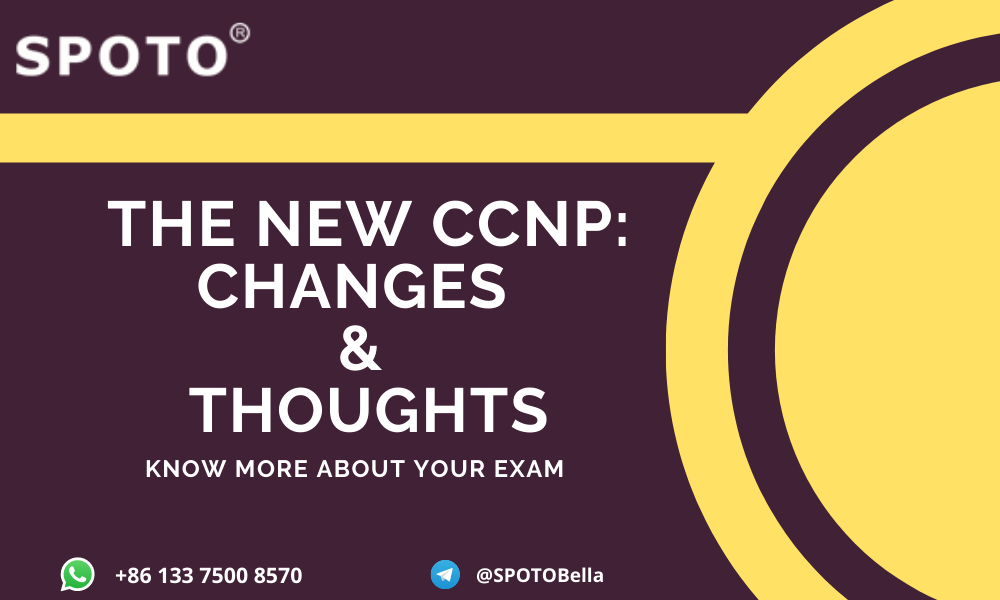Before 2020, the following CCNP tracks were available:
- Cloud Computing CCNP
- CCNP Concepts
- Collaboration with the CCNP
- Data Center for the CCNP
- Cisco Certified Network Professional (CCNP) Routing and Switching
- Provider of CCNP Services
- Wireless CCNP
- Security CCNP
- The following CCNP tracks are now available:
- Data Center for the CCNP
- Collaboration with the CCNP
- Enterprise CCNP
- Security CCNP
- Provider of CCNP Services
- Cisco DevNet Certified Professional (new)
- Cisco CyberOps Certified Professional (new)
New Criteria for CCNP Certification:
As they are tied to the Cisco Certificate Network Professional certification, the new Exams included additional requirements for being “Certified.”
Instead of passing a minimum of three to four tests under the old system, you will now need to pass only two exams to earn the CCNP credential.
Before you may get certified under the new system, you must complete two distinct components:
1- A Technology Core Exam, which serves as a gateway to two different certification tracks. (CCNP & CCIE).
— and it will be like follows:
– Enterprise, Security, Service Provider, Collaboration, and Data Center, as well as the newly formed DEVNET and CyberOps
2- On a Technology Concentration Exam, each of the seven domains described in Point “1” has between one and seven different technologies to concentrate on.
This is similar to earning a Master’s degree in engineering; you explore certain broad topics and concentrate on others.
Perhaps conduct more study on that specific issue; in the end, you will be a “Master” in a broad sense, with a little specification in your master certificate referring to the research/project you conducted.
And CCNA is no longer a prerequisite for any CCNP test; in fact, no exam has prerequisites; simply enroll in the exam you choose to take and you will receive a badge.
Notice:
Additionally, one issue worth noting is that the previous CCDP has been phased out, enabling you to begin studying network design with either the CCDE directly or the newly formed ENSLD exam, which covers the Enterprise domain.
which you may also utilize in conjunction with the CCNP Enterprise Core exam (CCNP ENCOR) to earn the CCNP Enterprise Badge!
Changes to the CCIE
As with the CCNA and CCNP certifications, the current CCIE level is divided into multiple subcategories, including CCIE Routing and Switching, Security, Collaboration, Service Provider, Data Center, and Wireless.
Additionally, the new revised CCIE level will be streamlined into fewer specialties, including the following:
- Enterprise Infrastructure CCIE (wired networks)
- CCIE Enterprise Wireless CCIE Enterprise Wireless
- Security CCIE
- Provider of CCIE Services
- Data Center CCIE
- Collaboration with the CCIE
At the moment, earning a CCIE requires passing both a written and a lab test.
With the new CCIE level, there will be two tests required for each track:
1. A Core Technology Examination (same as CCNP core exam).
2. A lab examination consisting of two modules (Design and “Deploy, Operate, and Optimize”).
Again, if you get a CCIE today, it will remain valid through February 24. (for a period of 3-years from passing the cert.)
Changes to the CCNP
With the existing CCNA pathways, professionals were forced to pick a specialty at the CCNA level (e.g Routing&Switching, Security, etc).
However, with the latest improvements, experts will be able to focus on a certain area of technology.
At the present CCNP level, various specialized tracks are available, including Routing&Switching, Security, Service Provider, Cloud, Wireless, and Data Center.
Additionally, the new revised CCNP level will be streamlined into fewer specialties, including the following:
- Enterprise CCNP (wired and wireless fields)
- Security CCNP
- Provider of CCNP Services
- Data Center for the CCNP
- Collaboration with the CCNP
- Cisco DevNet Certified Professional
At the moment, earning a CCNP requires passing three or four examinations (depending on which specialization you are looking at). With the new CCNP designation, you will only need to pass two exams:
1. An introductory examination covering fundamental ideas.
2. A Concentration Exam, based on the specialty desired (see above).
Additionally, the new CCNP does not require any pre-requisite exams.
As with the CCNA, those who get a CCNP certification before February 24, 2020, will be automatically “upgraded” to the new equivalent CCNP. The three-year expiration period remains in effect, and you will be required to recertify with the new tests in the future.
Changes to the CCNA
All CCNA tracks (specializations) will be discontinued, including CCNA Routing&Switching, Security, Wireless, Cloud, Data Center, Industrial, and Service Provider.
All of these courses will be combined into a single test (200-301), which will result in a single certification known as just CCNA. Thus, the new CCNA 200-301 exam will assess candidates’ expertise in a variety of domains (drawn from prior CCNA tracks), as well as their abilities to automate and program.
Come and join us ,SPOTO will be a good helper during you’re preparing for your exam.
Latest SPOTO Candidates Pass Feedback



Comments